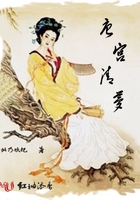"Where did you get the Englishman?" asked Usanga, the black sergeant, of the chief Numabo. "Are there many more with him?""He came down from the sky," replied the native chief "in a strange thing which flies like a bird and which frightened us very much at first; but we watched for a long time and saw that it did not seem to be alive, and when this white man left it we attacked him and though he killed some of my warriors, we took him, for we Wamabos are brave men and great warriors."Usanga's eyes went wide. "He flew here through the sky?"he asked.
"Yes," said Numabo. "In a great thing which resembled a bird he flew down out of the sky. The thing is still there where it came down close to the four trees near the second bend in the river. We left it there because, not knowing what it was, we were afraid to touch it and it is still there if it has not flown away again.""It cannot fly," said Usanga, "without this man in it. It is a terrible thing which filled the hearts of our soldiers with ter-ror, for it flew over our camps at night and dropped bombs upon us. It is well that you captured this white man, Numabo, for with his great bird he would have flown over your village tonight and killed all your people. These Englishman are very wicked white men.""He will fly no more," said Numabo "It is not intended that a man should fly through the air; only wicked demons do such things as that and Numabo, the chief, will see that this white man does not do it again," and with the words he pushed the young officer roughly toward a hut in the center of the village, where he was left under guard of two stalwart warriors.
For an hour or more the prisoner was left to his own devices, which consisted in vain and unremitting attempts to loosen the strands which fettered his wrists, and then he was inter-rupted by the appearance of the black sergeant Usanga, who entered his hut and approached him.
"What are they going to do with me?" asked the English-man. "My country is not at war with these people. You speak their language. Tell them that I am not an enemy, that my people are the friends of the black people and that they must let me go in peace."Usanga laughed. "They do not know an Englishman from a German," he replied. "It is nothing to them what you are, except that you are a white man and an enemy.""Then why did they take me alive?" asked the lieutenant.
"Come," said Usanga and he led the Englishman to the doorway of the hut. "Look," he said, and pointed a black forefinger toward the end of the village street where a wider space between the huts left a sort of plaza.
Here Lieutenant Harold Percy Smith-Oldwick saw a num-ber of Negresses engaged in laying fagots around a stake and in preparing fires beneath a number of large cooking vessels.
The sinister suggestion was only too obvious.
Usanga was eyeing the white man closely, but if he expected to be rewarded by any signs of fear, he was doomed to dis-appointment and the young lieutenant merely turned toward him with a shrug: "Really now, do you beggars intend eating me?""Not my people," replied Usanga. "We do not eat human flesh, but the Wamabos do. It is they who will eat you, but we will kill you for the feast, Englishman."The Englishman remained standing in the doorway of the hut, an interested spectator of the preparations for the coming orgy that was so horribly to terminate his earthly existence. It can hardly be assumed that he felt no fear; yet, if he did, he hid it perfectly beneath an imperturbable mask of coolness.
Even the brutal Usanga must have been impressed by the bravery of his victim since, though he had come to abuse and possibly to torture the helpless prisoner, he now did neither, contenting himself merely with berating whites as a race and Englishmen especially, because of the terror the British avia-tors had caused Germany's native troops in East Africa.
"No more," he concluded, "will your great bird fly over our people dropping death among them from the skies -- Usanga will see to that," and he walked abruptly away toward a group of his own fighting men who were congregated near the stake where they were laughing and joking with the women.
A few minutes later the Englishman saw them pass out of the village gate, and once again his thoughts reverted to various futile plans for escape.
Several miles north of the village on a little rise of ground close to the river where the jungle, halting at the base of a knoll, had left a few acres of grassy land sparsely wooded, a man and a girl were busily engaged in constructing a small boma, in the center of which a thatched hut already had been erected.
They worked almost in silence with only an occasional word of direction or interrogation between them.
Except for a loin cloth, the man was naked, his smooth skin tanned to a deep brown by the action of sun and wind. He moved with the graceful ease of a jungle cat and when he lifted heavy weights, the action seemed as effortless as the raising of empty hands.
When he was not looking at her, and it was seldom that he did, the girl found her eyes wandering toward him, and at such times there was always a puzzled expression upon her face as though she found in him an enigma which she could not solve.
As a matter of fact, her feelings toward him were not un-tinged with awe, since in the brief period of their association she had discovered in this handsome, godlike giant the attri-butes of the superman and the savage beast closely intermin-gled. At first she had felt only that unreasoning feminine terror which her unhappy position naturally induced.
To be alone in the heart of an unexplored wilderness of Central Africa with a savage wild man was in itself sufficiently appalling, but to feel also that this man was a blood enemy, that he hated her and her kind and that in addition thereto he owed her a personal grudge for an attack she had made upon him in the past, left no loophole for any hope that he might accord her even the minutest measure of consideration.















